Related Research Articles

Harold Rupert Leofric George Alexander, 1st Earl Alexander of Tunis, was a senior and highly decorated British Army officer who served in both of the world wars. In addition, following the end of his military career, he served as Governor General of Canada and became the first Lord Lieutenant of Greater London in 1965.

Admiral of the Fleet John Rushworth Jellicoe, 1st Earl Jellicoe, was a Royal Navy officer. He fought in the Anglo-Egyptian War and the Boxer Rebellion and commanded the Grand Fleet at the Battle of Jutland in May 1916 during the First World War. His handling of the fleet at that battle was controversial. Jellicoe made no serious mistakes and the German High Seas Fleet retreated to port, at a time when defeat would have been catastrophic for Britain, but the public was disappointed that the Royal Navy had not won a more dramatic victory given that they outnumbered the enemy. Jellicoe later served as First Sea Lord, overseeing the expansion of the Naval Staff at the Admiralty and the introduction of convoys, but was relieved at the end of 1917. He also served as the governor-general of New Zealand in the early 1920s.
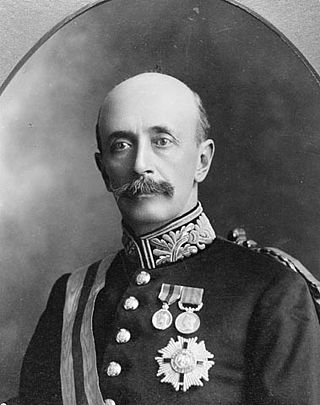
Albert Henry George Grey, 4th Earl Grey, was a British peer and politician who served as Governor General of Canada 1904–1911, the ninth since Canadian Confederation. He was a radical Liberal aristocrat and a member of a string of liberal high society clubs in London. An active and articulate campaigner in late Victorian England he was associated with many of the leading Imperialists seeking change.

Alexander Cambridge, 1st Earl of Athlone, was a member of the extended British royal family, as a great-grandson of King George III, a brother of Queen Mary, uncle to the Kings Edward VIII and George VI, and the husband of Princess Alice of Albany. He was a British Army commander, who served as Governor-General of the Union of South Africa and Governor General of Canada.
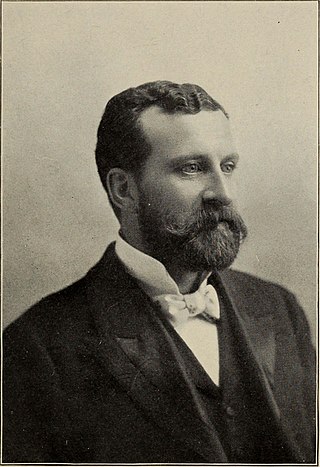
Sir Robert Bond was the last Premier of Newfoundland Colony from 1900 to 1907 and the first prime minister of the Dominion of Newfoundland from 1907 to 1909 after the 1907 Imperial Conference conferred dominion status on the colony. He was born in St. John's, Newfoundland, as the son of merchant John Bond. Bond grew up in St. John's until 1872 when his father died and left the family a good deal of money. He went to England where he was educated and came back to Newfoundland and articled under Sir William Whiteway.

William Humble Ward, 2nd Earl of Dudley, was a British aristocrat, politician, and military officer who served as the fourth Governor-General of Australia, in office from 1908 to 1911. He was previously Lord Lieutenant of Ireland from 1902 to 1905, and also a government minister under Lord Salisbury.
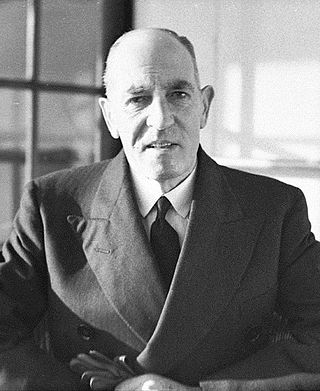
Admiral Sir David Murray Anderson, was a British naval officer and governor. Anderson served in the Royal Navy from the age of 13 and served in many colonial wars and was given various Empire postings, rising to the rank of admiral in 1931. He retired a year later and took up the posting as Governor of Newfoundland, where he also took up the role of Chairman of the Government following the suspension of self-government in the Dominion of Newfoundland. Leaving Newfoundland in 1935, he was appointed as Governor of New South Wales but served only briefly due to his ill health. He died while in office aged 62.

Edward Patrick Morris, 1st Baron Morris was a Newfoundlander lawyer and Prime Minister of Newfoundland.

The Imperial Order of the Crown of India is an order in the British honours system. The Order was established by Queen Victoria when she became Empress of India in 1878. The Order was open only to women, and no appointments have been made since the Partition of India in 1947. The Order was limited to British princesses, wives or female relatives of Indian princes and the wife or female relatives of any person who held the office of:

Field Marshal William Riddell Birdwood, 1st Baron Birdwood, was a British Army officer. He saw active service in the Second Boer War on the staff of Lord Kitchener. He saw action again in the First World War as commander of the Australian and New Zealand Army Corps during the Gallipoli Campaign in 1915, leading the landings on the peninsula and then the evacuation later in the year, before becoming commander-in-chief of the Fifth Army on the Western Front during the closing stages of the war. He went on to be general officer commanding the Northern Army in India in 1920 and Commander-in-Chief, India, in 1925.

Henry George Percy, 7th Duke of Northumberland,, styled Lord Warkworth between 1865 and 1867 and Earl Percy between 1867 and 1899, was a British Conservative politician. He served as Treasurer of the Household under Benjamin Disraeli between 1874 and 1875 and was Chairman of the National Union of Conservative and Constitutional Associations from 1879 to 1883.

Edward Montagu Cavendish Stanley, Lord Stanley, was a British Conservative politician. The eldest son of the 17th Earl of Derby, he held minor political office before being appointed Secretary of State for Dominion Affairs in 1938, sitting in the cabinet alongside his brother Oliver Stanley. However, Stanley died only five months after this appointment, aged 44; his eldest son, Edward John Stanley, later succeeded to the earldom in his stead.

Admiral of the Fleet Alfred Ernle Montacute Chatfield, 1st Baron Chatfield, was a Royal Navy officer. During the First World War he was present as Sir David Beatty's Flag-Captain at the Battle of Heligoland Bight in August 1914, at the Battle of Dogger Bank in January 1915 and at the Battle of Jutland in May 1916. After the war he became Commander-in-Chief, Atlantic Fleet and then Commander-in-Chief, Mediterranean Fleet before serving as First Sea Lord in the mid-1930s in which role he won arguments that the Royal Navy should have 70 cruisers rather than the 50 cruisers that had been agreed at the Naval Conference of 1930, that the battleship still had an important role to play despite the development of the bomber and that the Fleet Air Arm should be part of the Royal Navy rather than the Royal Air Force. He subsequently served as Minister for Coordination of Defence in the early years of the Second World War.
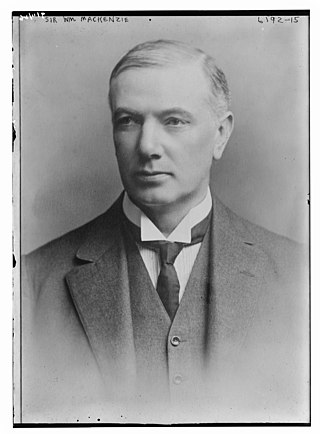
William Warrender Mackenzie, 1st Baron Amulree,, known as Sir William Mackenzie between 1918 and 1929, was a British barrister, public servant and Labour politician. He served as Secretary of State for Air under Ramsay MacDonald between 1930 and 1931.

William St John Fremantle Brodrick, 1st Earl of Midleton, KP, PC, DL, styled as St John Brodrick until 1907 and as Viscount Midleton between 1907 and 1920, was a British Conservative and Irish Unionist Alliance politician. He served as a Member of Parliament (MP) from 1880 to 1906, as a government minister from 1886 to 1892 and from 1895 to 1900, and as a Cabinet minister from 1900 to 1905.

(James) Ian Stewart Macpherson, 1st Baron Strathcarron, known as Sir Ian Macpherson, 1st Baronet, between 1933 and 1936, was a Scottish lawyer and Liberal politician. In 1931 he joined the breakway National Liberal Party.
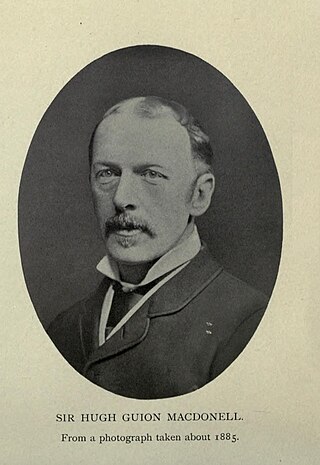
Sir Hugh Guion MacDonell was a British diplomat who was envoy to Brazil, Denmark and Portugal.
References
- ↑ McCreery, Christopher. The Canadian Honours System. Dundurn, 2015.
- ↑ McCreery, Christopher. The Canadian Honours System. Dundurn, 2015.
- ↑ "No. 27464". The London Gazette . 12 August 1902. p. 5173.
- ↑ "No. 33700". The London Gazette . 20 March 1931. p. 1877.
- ↑ "No. 34403". The London Gazette . 1 June 1937. p. 3506.
- ↑ "No. 33656". The London Gazette . 28 October 1930. p. 6563.
- ↑ "No. 35184". The London Gazette (Supplement). 6 June 1941. p. 3281.
- ↑ "No. 25614". The London Gazette . 6 August 1886. p. 3779.
- ↑ "No. 27497". The London Gazette . 21 November 1902. p. 7525.
- ↑ "No. 12172". The London Gazette . 24 August 1909. p. 917.
- ↑ "No. 29641". The London Gazette . 27 June 1916. p. 6333.
- ↑ "No. 31712". The London Gazette (Supplement). 30 December 1919. p. 1.
- ↑ "No. 31712". The London Gazette (Supplement). 30 December 1919. p. 2.
- ↑ "No. 33656". The London Gazette . 28 October 1930. p. 6563.
- ↑ "No. 33060". The London Gazette . 26 June 1925. p. 4259.
- ↑ "No. 33060". The London Gazette . 26 June 1925. p. 4259.
- ↑ "No. 34403". The London Gazette . 1 June 1937. p. 3505.
- ↑ "No. 37407". The London Gazette . 1 January 1946. p. 1.
- ↑ "No. 37407". The London Gazette . 1 January 1946. p. 1.
- ↑ "No. 37598". The London Gazette (Supplement). 4 June 1946. p. 2755.
- ↑ "No. 37835". The London Gazette (Supplement). 31 December 1946. p. 1.
- ↑ "No. 37835". The London Gazette (Supplement). 31 December 1946. p. 1.
- ↑ "No. 21396". The London Gazette . 28 December 1852. p. 3931.
- ↑ "No. 23450". The London Gazette . 15 December 1868. p. 6651.
- ↑ "No. 24192". The London Gazette . 19 March 1875. p. 1685.
- ↑ "No. 24569". The London Gazette . 5 April 1878. p. 2378.
- ↑ "No. 25557". The London Gazette . 9 February 1886. p. 613.
- ↑ "No. 27464". The London Gazette . 12 August 1902. p. 5174.
- ↑ "No. 23737". The London Gazette . 16 May 1871. p. 2329.
- ↑ "No. 24568". The London Gazette . 2 April 1878. p. 2304.
- ↑ "No. 33731". The London Gazette . 30 June 1931. p. 4241.
- ↑ "No. 23524". The London Gazette . 10 August 1869. p. 4421.
- ↑ "No. 26640". The London Gazette . 5 July 1895. p. 3805.
- ↑ "No. 29641". The London Gazette . 27 June 1916. p. 6333.
- ↑ "No. 30557". The London Gazette . 5 March 1918. p. 2775.
- ↑ "No. 26871". The London Gazette . 9 July 1897. p. 3768.
- ↑ "No. 27464". The London Gazette . 12 August 1902. p. 5174.
- ↑ "Privy Council Appointments 5 July 1911". The London Gazette. Retrieved 19 June 2022.
- ↑ "No. 30764". The London Gazette . 25 June 1918. p. 7461.
- ↑ "No. 33656". The London Gazette . 28 October 1930. p. 6563.